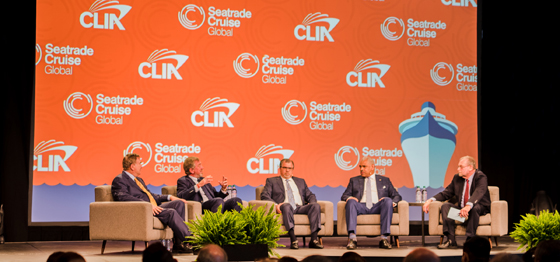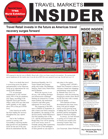
The keynote panel: Richard Fain, CEO of Royal Caribbean Cruises Ltd.; Pierfrancesco Vago, CEO of MSC Cruises; Frank Del Rio, CEO of Norwegian Cruise Line Holdings Ltd. and Arnold Donald, CEO of Carnival Corp. & plc.
Earlier this month, the 2018 SeaTrade Cruise Global event gathered 11,000 of the world’s top cruise line and port executives to discover the latest destinations, maritime innovations and cruise news.
Kicking off the four-day event was a two-part State of the Global Cruise Industry panel discussion, moderated by Peter Greenberg of CBS News, where executives from the top four cruise lines discussed a range of topics, following an introduction from Cindy D’Aoust, president of Cruise Lines International Association.
Ship builders are at full capacity as cruise lines order new vessels to keep up with the rapid pace of demand. There are about 80 cruise ships in development. Sixteen of these will be powered by clean liquefied natural gas, with the first of these to set sail in 2019, said D’Aoust in her opening remarks. LNG, which produces almost no sulfur when burned, is designed to reduce sulfur emission from ships’ exhausts.
The cruise industry has made a clear commitment to ocean conservation, clean water and sustainability, she said, adding that the cruise industry currently recycles 60% more than the average person.
The cruise industry, along with CLIA and trade organization Florida Caribbean Cruise Association, also played a major part in the recovery of the Caribbean following the devastation caused by Hurricanes Irma and Maria, not only by supplying money, transportation and emergency housing after the storms, but by returning their ships filled with tourists to the islands as soon as possible, bringing in vitally needed revenues.
D’Aoust also spoke of the industry’s partnership with the floating hospital Mercy ships, and announced the launch next year of a global program that will double its capacity to train medical personnel.
The keynote panel, Richard Fain, CEO of Royal Caribbean Cruises Ltd.; Pierfrancesco Vago, CEO of MSC Cruises; Frank Del Rio, CEO of Norwegian Cruise Line Holdings Ltd. and Arnold Donald, CEO of Carnival Corp. & plc, all agreed that business was very good in the cruise industry.
About 27 million people are expected to cruise in 2018 according to Cruise Lines International Association (CLIA), up from a record 25.8 million cruise passengers in 2017.
The panelists note that today’s ships feature cutting-edge entertainment options, but that they must build for future cruisers – even a decade in the future, to meet demand. And those demands will evolve as the demographics of cruisers are changing. Even though the majority of cruisers still come from the U.S., the international cruise market is becoming increasingly important.
Another important trend is that cruisers are getting younger. While Baby Boomers are still a major share of cruise travelers, about 25% of cruisers today are millennials. Cruising appeals to them as they search for that experiential holiday.
While their business is booming, the cruise executives are fully aware of the challenges surrounding them. Carnival Corp. & plc president and CEO Arnold Donald spoke of the danger of “overtourism,” when too many ships visit a destination port.
Citing Venice and Barcelona, MSC Cruises executive chairman Pierfranscesco Vago pointed out only 1 million of the 30 million day visitors to Venice each year are cruise passengers, but the cruise ships are the most visible.
Disagreeing with what Greenberg called ‘destination denigration,’ Royal Caribbean Cruises Ltd. chairman and CEO Richard Fain suggested that cruise lines spread out their shore excursions further, and do a better job of educating critics.
Norwegian’s Del Rio pointed out that more ports are requesting cruises, however, not discouraging them. RCL’s Fain noted that cruise lines have the ability to control the number of tourists and the flow to ease congestion.
The panelists also spoke of product differentiation and the trend towards larger ships.
RCL’s Fain, whose Symphony of the Seas will be the world’s largest cruise ship when it launches later this year, said: “I am not sure if bigger is better but better is better.”
Speaking of destinations and source markets, there was a lot of discussion about the potential of China’s 130 million tourists. Whereas China is forecast to become the world’s largest cruise market in the future, Carnival’s Donald pointed out that for now it is still tiny at about 2 million.
The opening of Cuba – which was the center of discussions at SeaTrade two years ago – is now up and running, despite the new restrictions implemented against land-based visits to the island by the Trump administration. Norwegian is doubling its capacity to Cuba this year and Carnival recently announced 17 new voyages to the island for next year.
In the second part of the keynote panel, Virgin Voyages Tom McAlpin and Ritz-Carlton Yacht Collection CEO Douglas Prothero discussed their new ground-breaking cruise lines which are currently under construction, and how different each will be from the current offering.
McAlpin, a former Disney Cruise line executive, explained why the Virgin ships will be “adult by choice” and how important a name is: “We are Virgin Voyages, not Virgin Cruises. Think about how the word ‘Voyages’ connotes adventure and a journey of discovery,” he said. Many first time cruisers have contacted them already due to the appeal of the Virgin name, he added.
Similarly Prothero explained the allure of the Ritz Carlton name and the “Yacht Collection” designation. The company is targeting a built in audience of Ritz Carlton hotel guests, among other high-end passengers.
This is the last year that SeaTrade Global is being held in Ft. Lauderdale. The event will return to the Miami Convention Center next year, where it will take place in April.









